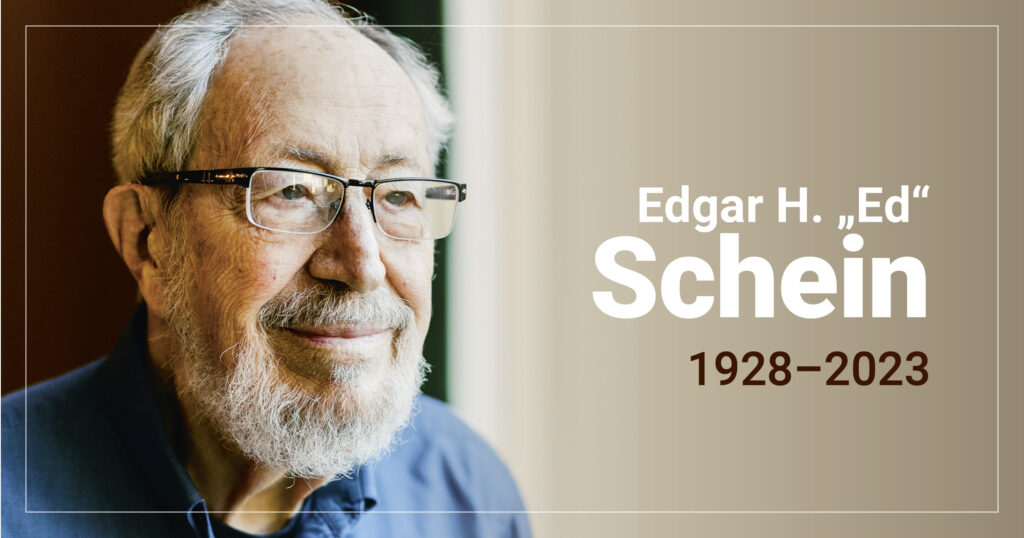
Edgar Schein passed away peacefully at home after he and his son Peter had just finished a productive afternoon of work with organization development colleagues. He passed without illness or suffering, as he had always hoped he would. He was 94.
He was born in Zurich Switzerland in 1928 and spent his childhood in Prague, Odessa and Zurich before coming to America at age ten where his father became a professor at the University of Chicago. Edgar’s undergraduate education began at University of Chicago, where he earned a bachelor’s in philosophy, followed by a BA and an MA in social psychology at Stanford University. He went on to get his PhD in social psychology from the Harvard University School of Social Relations and later joined the U.S. Army as a Captain charged with research on Chinese handling of prisoners of war following the Korean War, resulting in his first book, Coercive Persuasion (1961). His time at Walter Reed Army Medical Center coincidentally brought him to Mary Lodmell, the love of his life, mother of his three children and life partner until her passing in 2008.
Edgar spent forty years as a professor at Massachusetts Institute of Technology’s Sloan School of Management. He was Society of Sloan Fellows Professor of Management Emeritus and Professor Emeritus of Work and Organization Studies. In 2011, he moved to Palo Alto, California.
Recognized as one of the founders of the field of organizational psychology, his most notable early contributions were in the fields of organizational development and culture, process consultation, and career development. His 1965 book Organizational Psychology was followed by his Organizational Culture and Leadership which had 5 editions between 1985 and 2017. Other books by Edgar are Helping (2013), Humble Inquiry (2014) which won the business book of the year award from the Department of Leadership of the University of San Diego, Humble Consulting (2016), Humble Leadership (2018) which received a silver medal in the Nautilus Book Awards, the Corporate Culture Survival Guide, Humble Inquiry and Career Anchors Reimagined (2023) and Humble Leadership (2nd Ed. 2023) that both are soon to be published posthumously.
Edgar Schein and Peter Drucker were influential management thinkers of the 20th century. While they have different areas of focus and approach, their work shares some commonalities in terms of the importance of leadership, culture, and the role of management in shaping the success of organizations.
Edgar Schein’s work focused on organizational culture and how it affects behavior and performance within organizations. Schein identified three levels of organizational culture: artifacts, espoused values, and basic assumptions. Schein believed that to truly understand an organization’s culture, it is necessary to identify and address these underlying assumptions and values. Peter Drucker, on the other hand, focused more on the role of management and leadership in shaping the success of organizations. Drucker believed that the purpose of business was to create and satisfy customers, and that a company’s success ultimately depended on its ability to do so. He emphasized the importance of setting clear goals and objectives, aligning them with the goals of the organization, and holding individuals and teams accountable for achieving those goals.
Despite these differences in focus, there are several commonalities between Schein’s and Drucker’s work. Both emphasized the importance of leadership in shaping the success of organizations. Schein believed that leaders play a critical role in shaping organizational culture, while Drucker argued that effective leaders can set a clear direction for their organizations, inspire, and motive their employees, and make decisions that are in the best interest of the company. Both Schein and Drucker also recognized the importance of organizational culture in shaping behavior and performance within organizations. Schein’s model of organizational culture highlights the importance of identifying and addressing underlying assumptions and values, while Drucker emphasized the need for a customer-focused culture that drives innovation and growth. In addition, both Schein and Drucker recognized the importance of setting clear goals and objectives and aligning them with the goals of the organization. Schein’s model emphasizes the importance of espoused values, which are the stated beliefs and values of the organization that guide behavior and decision-making. Drucker’s concept of management by objectives is a goal setting and performance management approach that involves setting specific, measurable objectives for individuals and teams and aligning those objectives with the goals of the organization.
Overall, while their areas of focus may differ, the work of Edgar Schein and Peter Drucker shares several commonalities in terms of the importance of leadership, culture, and goal setting in shaping the success of organizations. By understanding and applying insights and principles from both Schein and Drucker’s work, leaders and managers can create a more effective and successful organization that is focused on meeting the needs of its customers and stakeholders.
In memory of Edgar Schein,
March 8 2023, Menlo Park, CA
Dr. Annika Steiber

